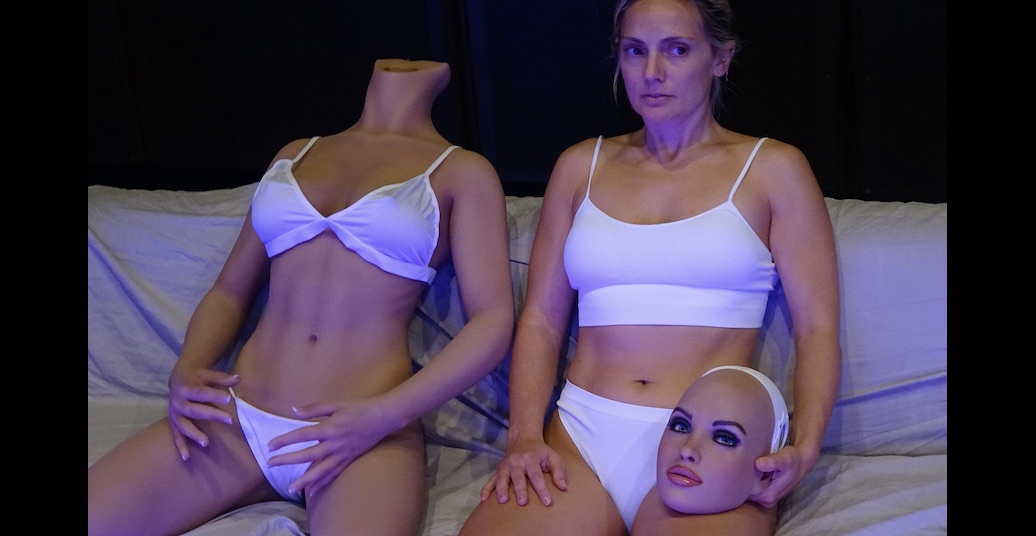In “Beyond Love,” the final installment in her trilogy about the economic and technological interpenetration of emotions running from 8 to 11 February 2023 at HAU3, the choreographer Dragana Bulut focuses on hybrid forms of love and desire between humans and machines.
At first it’s all still fun and games: a few minutes before the performance starts, there is an introduction in the foyer in which the audience is requested to make themselves nametags, fill out a short survey on their smartphones, and (please) help themselves to some free wine.
Some snickering over questions about “attachment style” or “relationship to your mother,” ironic indignation at the plastic wine glasses—the mood is relaxed, although for some the realization is slowly dawning that “Beyond Love” is going to be a participatory performance and that by making a nametag, we have just made ourselves into co-performers. Once inside HAU3’s theatre, the audience of approximately 50 finds a half-circle of tables waiting for us, each with two chairs facing one another (set design: Dragana Bulut, Jonas Maria Droste). Briefly, the rules are explained, and then we jump right in to a two-hour speed-dating marathon—“to make some new connections.”
Contrary to my anxious expectations, my social discomfort dissipates, and after just a short time, the intensity of the involvement that the piece asks of me buries the skepticism about such performance forms that I’ve accumulated over the years. Each round unfolds under the heading of a different variety of intimate relationship: we are asked about friendship, our most recent breakup, or our connection to our smartphones. Of course, the four minutes we are allotted in each case are really only enough for a teaser; but the comforting speed at which the wine glasses are emptying, the way we manage to skip the small talk, and a few fully nonverbal exchanges all do their part to thicken the fog of intimacy falling over this rendezvous-landscape a bit more after each round.
And then Harmony, the main performer of the piece, is carried onto the stage—and in stark contrast to what her name implies, her appearance immediately creates an atmosphere of ambiguity and confusion. Harmony’s body is a life-sized silicone clone of Caroline Neill Alexander (the second human performer in “Beyond Love,” alongside Dragana Bulut), highly stylized as a sex doll. Her removable head, on the other hand, is recognizable as a robot: movable eyes and mouth capable of lewd expressions, apparently controlled by an artificial intelligence extremely skilled in conversation. Harmony talks with Bulut and Alexander, regularly addresses audience members very specifically, and ultimately invites one person onto the stage for dinner. Promptly, she engages her guest in a self-conscious conversation about their relationship. She also repeatedly delivers, in short interludes, exactly what one expects from an AI: data analysis. One of the most memorable moments of the performance is the evaluation of the survey from the beginning of the night: “60% of you have said they are lonely. And 20% have said they are very lonely,” she states coolly, and a wave of differently-enacted coping mechanisms rolls through the semicircle of tables. Somewhat later Harmony passes around her two vaginas and breaks out into loud moans, asks someone across from her bluntly what he thinks of her body, or possessively demands proof of Alexander’s affection for her. Through the audience’s consistently conflicted reactions, “Beyond Love” makes it clear that the emotional as well as the erotic relationship between human and machine is much more complicated than we generally realize.
A not insignificant number of the numerous works on digital technologies and algorithms that have emerged out of contemporary dance contexts in recent years have been characterized by a guileless fascination with their subject matter. Somatic intelligence has been worshipped (almost mystically) for far too long; its successor is uncritical adoration of artificial intelligence, often much too close for comfort to the neoliberal, quasi-religious belief in innovation. “Beyond Love,” on the other hand, skillfully dodges the pitfalls of cultural pessimism and technological optimism, instead mapping the potential of technologized love with an approach that is at once entertaining and critical. Repeatedly it brings up the question: aren’t machines really much more human than we generally give them credit for—and aren’t we humans much more machinelike than we admit? And if we give ourselves the license to really follow these two tendencies to their logical conclusions, where do we end up?
In the 90s, psychologist Arthur Aron developed a guide for falling in love—a catalogue with 36 questions that, if answered together, were supposed to lead reliably to a relationship. Not only his own study, but also other reports indicate that his instructions actually work. Is love, then, ultimately also algorithmable? “Beyond Love” creates reasonable uncertainty regarding the fulfillment of romantic love and the contribution that digital technologies can make to it. But perhaps (as the performance seems to suggest at times) dating apps, sex dolls, and speed dating formats are also answers to the wrong question, in the face of all the notoriously unsatisfied longing that is being uncovered. In this vein, the show also ultimately abandons somewhat its commitment to ambiguity in favor of the promise of community, which, it seems to me, hits a nerve that runs through the evening. Yet I am left with the impression remains that the next cruel optimism—as Lauren Berlant puts it—is already lurking here.
English translation by Cory Tamler
„Beyond Love“ by Dragana Bulut (Premiere: 8 February 2023) can still be seen at HAU3 on 10 & 11 February 2023 at 6pm & 9pm respectively. Tickets may still be available at the box office: hebbel-am-ufer.de.




